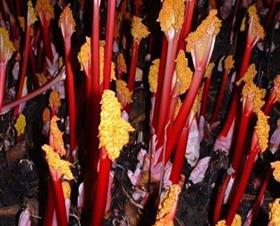
When Delia Smith appeared in a 2010 Waitrose commercial offering the nation a recipe for rhubarb crème brulée, it caused a run on rhubarb that the supermarket struggledto fulfil.
However, lucky shoppers at selected stores need not worry about missing out on this plant that’s used like afruit as the supermarket last week started to stock extended-season forced rhubarb from Herefordshire grower Cobrey Farms.
Forced rhubarb traditionally has its roots in West Yorkshire in the area that forms a triangle between Wakefield, Morley and Rothwell, now a Protected Designation of Origin whose season ends in April, when field-grown rhubarb has traditionally taken over.
Cobrey Farms is using a hybrid process of growing outside but covering the crop so that it is sweeter, tender and with the pink colouring that rhubarb fans like Delia desire.
“I think when people ask for rhubarb, it’s the forced variety,” says Cobrey Farms’ Chris Chinn. “We are supplying Waitrose with fresh trimmed rhubarb, it’s the first time we have supplied the supermarket and we’re in selected stores at the moment but I do believe the demand is there.”
Demand for forced rhubarb is there, but often at a price given the costs involved in producing the crop. With the plant grown in sheds or under cover, it would be easy to assume that it has not been affected by the weather. Yet according to Janet Oldroyd Hulme of E Oldroyd & Sons, one of the largest producers in the rhubarb triangle, the previous two washout summers have impacted on the rootstocks that are then transferred to the sheds, so yields were down. E Oldroyd & Sons grows some 200 tonnes, supplying supermarkets such as Marks& Spencer, where so far this year sales are up by eight per cent.
“Despite a challenging start to the year due to difficult weather, rhubarb stocks are now at a good level and flying off the shelves,” says a spokesman.
Oldroyd Hulme says they are now hoping for a moderate summer, not too dry and not too wet, to help the 800 tonnes of outdoor-grown rhubarb they grow flourish in the fields.
While E Oldroyd & Sons in the majority supplies supermarkets with both types of fresh rhubarb, the business is looking to the processing sector, where there is increasing demand.“We have just supplied an order for what will become rhubarb wine,” says Oldroyd Hulme.“The sector is expanding rapidly, with demand for pies and juices. Our main customers will always be supermarkets, but for the produce they cannot take we are looking to fulfil orders from processors.”
With the trend for nostalgic tastes showing no sign of letting up, rhubarb remains a favourite choice. Let’s hope that the weather favours it too.



